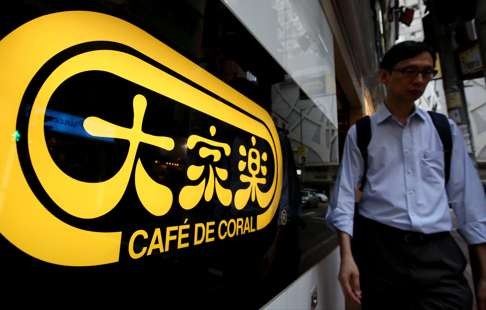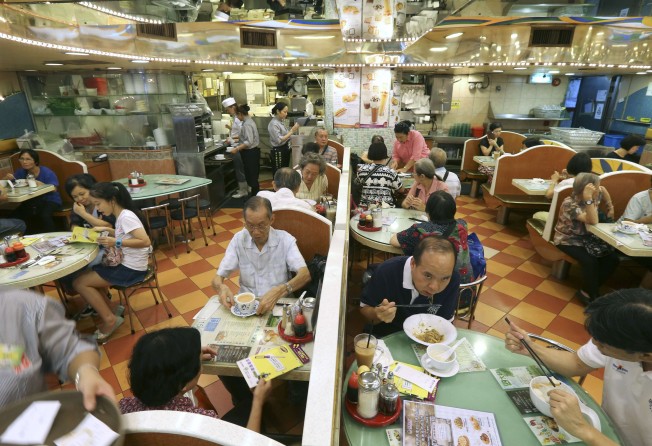
Restaurants advised to tread carefully with mainland ambitions
Fast-food chains Café de Coral and Fairwood see strong rises in their share prices after growing steadily across the border

Hong Kong restaurant groups are proving that a cautious, less-aggressive approach to expanding their operations into mainland China, can certainly pay dividends.
As growth into China is increasingly viewed as a must for many business sectors, given the rising spending power of its burgeoning middle classes, analysts say the restaurant business can traditionally be a lot more fickle than other areas.
And three examples of restaurant firms trying their luck at expanding there, prove the point.
Hong Kong fast-food chains Café de Coral and Fairwood have seen strong rises in their share prices after growing steadily across the border.
While another company, Cha Chaan Teng chain operator Tsui Wah, which has been expanding faster in the mainland, has seen its shares hammered.
“Many Hong Kong restaurants have failed to make money from their mainland operations in the past,” said Daniel So Pui-fung, a strategist at China Merchants Bank International Securities.
“It might be that the food they offer isn’t to mainlanders’ tastes, but I think it is more to do with this being a highly competitive industry, and with the economic slowdown, that’s become even fiercer.”
Tsui Wah, especially, has had a torrid time of late, recording a 54 per cent fall in net profits for the year ended March 31.
Its chairman Lee yuen hong, said in its annual report that several of its restaurants in Hong Kong and “most of our Chinese mainland sites” were loss-making.
The company operates 35 restaurants in Hong Kong, and now has 24 in the mainland China and two in Macau, but the mainland business has suffered most.
“I tried Tsui Wah once,” Sandy Wang, a Shanghaier, told the Post.
“I don’t normally eat Hong Kong-style food, but Tsui Wah’s food was expensive.
I spent 300 yuan for dinner with a friend, but 300 yuan can buy me a very big meal in many other restaurants.”

Fast food restaurant chain Fairwood, on the other hand, has taken a steadier, more prudent approach to growing its business on the mainland, say analysts, opening just 10 sites there on top of its 125 in Hong Kong, and that approach has proved a hit with investors.
Its share price reached a historic high of HK$ 29.95 on June 29 when it reported a 39.5 per cent rise in its profit to HK$ 201 million for the year ended March 2016.
“As the mainland China market is expected to remain competitive, we will monitor it closely and take prudent steps to expand in the south of the country, particularly in Guangzhou and
Shenzhen,” said Dennis Lo Hoi Yeung, its executive chairman in the firm’s annual report.
In the month ended July 13, its share price rallied 24.09 per cent.
Café de Coral and Fairwood ideally satisfy the needs of these local customers, because they provide cheap, fast and filling food, while the food in Tsui Wah, for instance, is considered expensive
Another firm to have benefited from taking a less-aggressive approach to mainland expansion, is Hong Kong fast-food chain Café de Coral, which saw a 13 per cent rise in its share price during the same one-month period, despite a 12 per cent fall in its net annual profits.
As of 31 March 2016, it operated a total of 282 restaurants in Hong Kong and had a chain of 110 outlets in mainland China.
Both companies outperformed the Hang Seng index’s rise of 3.95 per cent, during the month, as Tsui Wah’s shares slumped over ten per cent.
Daniel So said that fast-food companies are being viewed so favourably by the market, because they are making their moves slowly, and targeting one particular area of the mainland restaurant business which is enjoying strong growth.
“They are gaining favour, even amid a weak economy because these cheaper restaurant chains are not so closely linked to economic growth.
“Fast-food chains like these two really benefit from a slower market,” said So.

“No matter how weak an economy is, everyone has to eat – but you have to choose cheaper food when times are harder, added So.
“I believe these types of cheaper restaurant will fare better than middle or high-end competitors,” he said, and that’s clearly becoming good news for the likes of Fairwood and Cafe de Coral.
Victor Au, chief operating officer at Delta Asia Securities agrees, adding that customers have become thriftier with the economy not performing so well, and that sentiment is extending to cheaper eating and food.
“Café de Coral and Fairwood ideally satisfy the needs of these local customers, because they provide cheap, fast and filling food, while the food in Tsui Wah, for instance, is considered expensive,” he said.
The fact that Tsui Wah’s Hong Kong sites are also in areas more popular with tourists — another sector being hit hard by the economic downturn — has put even more added pressure on the company, said Au, as visitor numbers continue to fall.
According to the latest figures from property agent CBRE, expected cuts in commercial rentals in Hong Kong might help take even more pressure off ambitious local restaurants here.
Street shop rents in core locations dropped 6.8 per cent in the first half of 2016, and it expects an overall annual cut of around 10 to 15 per cent.
Café de Coral and Fairwood have also been offering investors attractive dividends, amid the lower interest-rate environment, added So.
“Low interest rates will remain globally for at least the coming year, and so high dividend shares, treated as defensive stocks amid a lacklustre market, will continue to find favour.”
Fairwood announced a 75 per cent rise in its annual dividend for the year ending March, to HK140.0 cents, while Café de Coral’s final dividends rose 3.3 per cent to HK$ 63 cents and also special dividend of HK$ 35 cents.